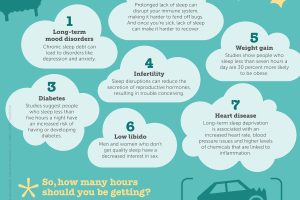The Importance of Adequate Sleep for a Healthy Lifestyle

Definition of Adequate Sleep
Adequate sleep is often described as a sufficient duration of restful, high-quality sleep that allows individuals to wake up feeling rejuvenated and ready to tackle the day. Generally, adults are recommended to get between seven to nine hours of sleep each night, but personal requirements may vary based on age, lifestyle, and health. For instance, teenagers typically need more around 8 to 10 hours, reflecting their active growth and development. Here are some key components of adequate sleep:
- The Importance of Adequate Sleep for a Healthy Lifestyle
- Definition of Adequate Sleep
- Overview of Healthy Lifestyle
- Effects of Inadequate Sleep
- Impact on Physical Health
- Impact on Mental Health
- Importance of Sleep Quality
- Relation to Overall Well-being
- Role in Cognitive Function
- Tips for Improving Sleep
- Establishing a Bedtime Routine
- Creating a Comfortable Sleep Environment
- Sleep Hygiene Practices
- Limiting Screen Time Before Bed
- Avoiding Caffeine and Heavy Meals Before Sleep
- Connection Between Sleep and Exercise
- Impact on Physical Performance
- Influence on Recovery and Muscle Growth
- Sleep and Weight Management
- Effects on Metabolism
- Relationship to Appetite Regulation
- Duration: Consistently clocking in 7-9 hours per night.
- Quality: Deep sleep, which includes essential REM stages crucial for cognitive functions.
- Consistency: Going to bed and waking up at the same time each day.
Overview of Healthy Lifestyle
Sleep is one of the cornerstones of a healthy lifestyle, interconnected with various well-being facets, including nutrition and physical activity. It’s not just about the hours spent in bed; it’s about optimizing those hours to enhance overall health and productivity. Consider the following aspects of a healthy lifestyle:
- Balanced Diet: Eating a variety of foods, rich in nutrients, contributes to better sleep and overall health.
- Regular Exercise: Physical activity is linked to improved sleep quality and helps regulate sleep-wake cycles.
- Stress Management: Healthy coping mechanisms like meditation and breathing exercises can facilitate better sleep.
By incorporating these elements into daily life, individuals can create a strong foundation for a healthier and more vibrant existence.
Effects of Inadequate Sleep
Impact on Physical Health
Inadequate sleep can significantly affect physical health in various ways, often manifesting in symptoms that can compromise daily functioning. A personal experience one might share is that lethargic feeling after a night of tossing and turning—it’s not just in your head; your body is also affected. Here are some physical health impacts associated with insufficient sleep:
- Weakened Immune Function: Chronic sleep deprivation can lead to an increased risk of infections and illnesses.
- Weight Gain: Lack of sleep can disrupt hormones responsible for appetite regulation, leading to increased cravings and weight gain.
- Higher Risk of Chronic Conditions: Studies show a link between inadequate sleep and conditions like diabetes, heart disease, and hypertension.
Impact on Mental Health
On the mental health front, the effects of inadequate sleep can be equally daunting. It’s common for individuals to feel irritable or anxious after a poor night’s sleep, but the repercussions are often more profound. Consider these mental health ramifications:
- Increased Anxiety and Depression: Persistent sleep deprivation can exacerbate feelings of sadness and worry.
- Impaired Concentration: A lack of sleep hampers cognitive function, affecting decision-making and productivity.
- Mood Swings: Heightened emotional reactivity can lead to difficult social situations and strained relationships.
Recognizing these impacts underscores the importance of prioritizing sleep as a vital component of overall health and well-being.
Importance of Sleep Quality
Relation to Overall Well-being
Sleep quality is not just about the number of hours spent in bed; it is crucial for achieving optimal overall well-being. Whether you’re tackling work deadlines or participating in family activities, the way you feel physically and emotionally can hinge on how well you sleep. Consider this: after a night of good sleep, you likely feel energized and motivated to face the day. In contrast, poor quality sleep can lead to a sluggish morning and a grumpy disposition. Here are some ways sleep quality contributes to overall well-being:
- Enhanced Mood: Quality sleep can significantly improve your emotional resilience, making you better equipped to handle stress.
- Boosted Immune System: A well-rested body is more effective at fighting off infections, allowing you to maintain a healthier lifestyle.
- Increased Energy Levels: Quality sleep leads to higher energy counts, encouraging physical activity and social interactions.
Role in Cognitive Function
The impact of sleep quality extends deeply into cognitive function. Good sleep is foundational for mental clarity, creativity, and problem-solving abilities. Imagine trying to brainstorm innovative ideas on just a few hours of sleep—it’s challenging at best! Consider these cognitive functions that are significantly influenced by quality sleep:
- Memory Consolidation: Sleep plays a critical role in processing and storing memories, making it essential for learning and retention.
- Improved Concentration and Focus: A well-rested mind is sharper, making tasks more manageable and less mentally draining.
- Innovation and Creativity: Many people find that some of their best ideas come after a restful night; quality sleep fosters creative thinking.
By acknowledging the importance of sleep quality, individuals can take proactive steps to enhance their sleep hygiene, which ultimately enriches their overall quality of life.
Tips for Improving Sleep
Establishing a Bedtime Routine
Establishing a bedtime routine is a powerful way to signal to your body that it’s time to wind down. Think of it as a series of gentle cues that help transition you from the busyness of the day to a state of relaxation. After experimenting with different routines, many individuals find a consistent approach makes all the difference. Here are some effective steps to consider:
- Set a Consistent Bedtime: Aim to go to bed and wake up at the same time every day, even on weekends.
- Wind Down: Dedicate 30 minutes to activities such as reading, taking a warm bath, or practicing gentle yoga.
- Limit Stimulants: Avoid caffeine, nicotine, and heavy meals at least two hours before bedtime to ensure a smoother transition into sleep.
Creating a Comfortable Sleep Environment
In addition to a structured routine, crafting a comfortable sleep environment can enhance sleep quality significantly. Reflecting back, many find that opting for a few comfort-focused improvements often pays off in the long run. Consider these key elements for a comfortable sleep environment:
- Optimal Temperature: Keep your bedroom cool—between 60 to 67 degrees Fahrenheit is ideal for many.
- Quality Bedding: Invest in a supportive mattress and soft, breathable sheets. A comfortable pillow can be a game-changer too!
- Limit Noise and Light: Use blackout curtains and white noise machines, or earplugs, to minimize disruptions.
By thoughtfully establishing a bedtime routine and creating an inviting sleep environment, individuals can enhance their chances of enjoying a restful night’s sleep.
Sleep Hygiene Practices
Limiting Screen Time Before Bed
In today’s digital age, many find it challenging to detach from electronic devices before bedtime. Whether it’s scrolling through social media or binge-watching a favorite series, screens can play a significant role in disrupting sleep. The blue light emitted by phones, tablets, and computers can interfere with the body’s natural production of melatonin, the hormone responsible for regulating sleep. To improve sleep hygiene, consider adopting these strategies:
- Set a Technology Curfew: Aim to power down screens at least 30 to 60 minutes before bedtime. You might find it helpful to set an alarm as a reminder.
- Engage in Alternative Activities: Replace screen time with calming activities like reading or listening to calming music. Personally, I’ve found that curling up with a good book leads to a far more restful night.
- Create a Charging Station Outside the Bedroom: Make it a habit to charge devices outside your sleep space, which reduces temptation and promotes a more restful atmosphere.
Avoiding Caffeine and Heavy Meals Before Sleep
What and when you eat can also impact your sleep quality. Consuming caffeine too close to bedtime can keep you alert when you’re trying to wind down. Additionally, indulging in heavy meals can lead to discomfort and keep you tossing and turning. Here are practical tips to consider:
- Caffeine Cutoff: Try to limit caffeine intake after 2 PM. Opt for herbal teas or decaffeinated beverages in the evening to help signal relaxation.
- Mindful Eating: Avoid large, heavy meals within two to three hours of bedtime. Instead, if needed, a light snack—think yogurt or a banana—can satisfy hunger without hindering sleep.
By implementing these sleep hygiene practices, individuals can pave the way toward a more restorative, undisturbed night of sleep.
Connection Between Sleep and Exercise
Impact on Physical Performance
The connection between sleep and exercise is profound, with adequate sleep playing a crucial role in enhancing physical performance. Think back to those days when you felt energized and focused during a workout—chances are, you had a good night’s sleep beforehand. On the flip side, we’ve all experienced how a restless night can negatively impact our ability to perform at the gym or during a run. Here are key reasons why sleep is vital for physical performance:
- Enhanced Endurance: Quality sleep improves oxygen flow and nutrient delivery during workouts, allowing athletes and fitness enthusiasts to push their limits.
- Improved Reaction Time: Adequate rest helps with coordination and agility, which is essential for sports and high-intensity training.
- Better Motivation: A well-rested mind is more likely to stay committed and motivated to stick to workout routines, leading to long-term fitness gains.
Influence on Recovery and Muscle Growth
Following intense physical activity, recovery is essential, and sleep plays a pivotal role in this process. It’s during deep sleep that the body repairs itself, making it fundamental for muscle growth and regeneration. Many fitness enthusiasts notice that on nights following rigorous workouts, their quality of sleep directly affects recovery. Consider the following factors:
- Hormonal Regulation: Sleep promotes the production of growth hormone, which is critical for muscle repair and growth.
- Reduced Inflammation: Quality sleep helps reduce inflammation in the body, making it easier to recover from strenuous exercises.
- Mental Recovery: Resting adequately also helps in reducing mental fatigue, refreshing focus and determination for the next workout.
By recognizing the significant connection between sleep and exercise, individuals can optimize both their workout performance and recovery, fostering a healthier lifestyle overall.
Sleep and Weight Management
Effects on Metabolism
The relationship between sleep and weight management is intricate, with sleep quality and duration playing essential roles in metabolic processes. When individuals skimp on sleep, they may unknowingly disrupt their body’s metabolic efficiency. Personally, after a sleepless night, I’ve often noticed feeling sluggish, which translates into lower energy expenditure throughout the day. Here are some critical ways inadequate sleep can affect metabolism:
- Insulin Sensitivity: Lack of sleep can reduce the body’s sensitivity to insulin, making it harder to regulate blood sugar levels and increasing the risk of weight gain.
- Decreased Energy Expenditure: Poor sleep can lead to reduced physical activity, meaning fewer calories are burned overall.
- Altered Hormone Levels: Sleep deprivation can impact hormones that regulate metabolism, leading to increased fat storage.
Relationship to Appetite Regulation
Beyond metabolic effects, sleep is intricately linked to appetite regulation. Many may be surprised to learn that what happens overnight can drastically affect food cravings and hunger levels. Consider these key points regarding sleep’s influence on appetite:
- Hormonal Imbalance: Sleep deprivation leads to increases in ghrelin (the hunger hormone) and decreases in leptin (the hormone that signals fullness), resulting in heightened food cravings.
- Increased Cravings for Unhealthy Foods: Lack of sleep tends to shift cravings toward high-calorie, carbohydrate-rich foods, which can undermine weight management efforts.
- Reduced Willpower: Fatigue influences decision-making, often making it more challenging to resist unhealthy choices.
By understanding the profound impact of sleep on metabolism and appetite regulation, individuals can take proactive measures to enhance their sleep hygiene, ultimately empowering their weight management efforts.





